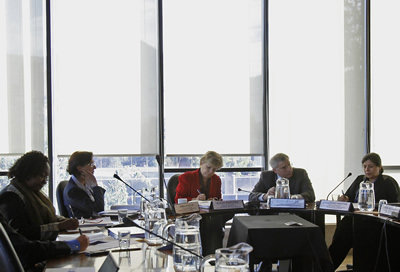United Nations' Regional Commissions Reaffirm Their Commitment to Support Member States through the Post-2015 Development Process
Heads of the UN regional organizations deliberated on collective interregional actions to support regions and member countries in shaping the future development agenda.

(19 March 2014) The heads of the five United Nations regional commissions ended a two day meeting at the headquarters of the Economic Commission for Latin America and the Caribbean (ECLAC) in Santiago, Chile, reaffirming their commitment to support and accompany their Member States through the post-2015 development agenda process, already being discussed within different forums in the world organization.
The meeting was attended by the Executive Secretaries of the Economic Commission for Europe (ECE), Sven Alkalaj; the Economic and Social Commission for Asia and the Pacific (ESCAP), Shamshad Akhtar; the Economic and Social Commission for Western Asia (ESCWA), Rima Khalaf; the Special Advisor for Post 2015 Development Agenda of the Economic Commission for Africa (ECA), Aida Opoku-Mensah; and hosted by ECLAC's Executive Secretary, Alicia Bárcena.
The top UN regional officials also held a dialogue with the High-Level Committee on Programmes (HLCP), the policy pillar of the Chiefs Executive Board for Coordination (CEB) of the United Nations, which had its 27 session at ECLAC headquarters in Santiago, chaired by Achim Steiner, Executive Director of the United Nations Environment Programme (UNEP).
The HLCP work includes fostering policy coherence and programme coordination in response to inter-governmental mandates and in support of internationally agreed development goals, and supporting integrated and coordinated preparation of and follow-up to major United Nations conferences and summits, among other duties.
In this dialogue were also present the Secretary-General's Special Advisors on Post-2015 Development Planning, Amina J. Mohammed, and Interregional Policy Cooperation, Juan Somavía.
The heads of the regional commissions agreed that 2014 will be a key year for moving forward with intergovernmental negotiations to establish the post-2015 sustainable development agenda and build consensus on a new set of ambitious, global goals to succeed the Millenium Development Goals (MDGs).
They stressed that the aspirations of the regions should be met. The global agenda should provide the needed flexibility and support, including appropiate means to the regions and member countries to attain such aspirations, they added.
They also agreed on a number of collective interregional initiatives in support of their regions and countries.
"We are trying to accompany our Member States in their road to sustainable development. To do so we must address the most urgent challenges of our society: poverty and inequality. We must put equality at the center and promote a structural change in our economies where growth, productivity and sustainability are not at odds with each other", said Alicia Bárcena, Executive Secretary of ECLAC, who is the current coordinator of the regional commissions.
During the meeting, the representatives of the UN organizations acknowledged the importance of considering the regional perspective in the global discussions and the implementation of a new development framework based on cooperation and a more equitable and sustainable path.
For further questions, please contact ECLAC's Public Information Unit.
E-mail: prensa@cepal.org; Tel.: (56 2) 2210 2040.
Follow us on Twitter, Facebook, Flickr, YouTube and Google+.
Country(ies)
- Latin America and the Caribbean
Contact
Public Information Unit
- prensa@cepal.org
- (56 2) 2210 2040